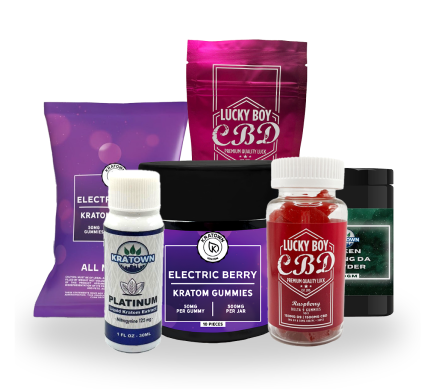
Can Kratom Help with Managing Depression and Anxiety?
What do kale and cannabis have in common? They’re leaves that have become staples in health and wellness communities. And joining this club of legendary leaves is kratom.
Kratom is currently rising in popularity in wellness circles and is embraced for its reported effects on energy levels and chronic pain relief.
In fact, vendors sometimes even market kratom for anxiety, given its alleged impact in offering the user more calmness. Just think of it—a natural remedy for mental health challenges sounds pretty alluring.
After all, even plants want to help us out. But how much would kratom really help with managing your anxiety or depression? Let’s find out.
What Exactly Is Kratom?
Straight from the lush forests of Southeast Asia in countries like Thailand and Malaysia, kratom is commonly consumed as powder, capsules, teas, and even flavored kratom gummies.
It contains the active compounds of mitragynine and 7-hydroxymitragynine—a tongue-twister, we know—which work with the opioid receptors in your brain. Kratom is one of nature’s great multi-taskers. It can help users by boosting both energy and calmness—it’s the real MVP.
How Kratom Might Help
Since it interacts with those opioid receptors, kratom could help you with mood regulation, pain relief, and your response to stress.
Some users report the sedative effects of kratom when taken at higher doses. This reduction of the brain’s overactivity is said to promote a sense of calm that can then even alleviate anxiety symptoms like rapid heartbeat or muscle tension.
At lower doses, kratom consumers sing of its stimulant superpowers, noting a big jump in alertness, energy, and focus. This points to kratom’s potential benefits in reducing feelings of hopelessness and combatting the fatigue that is commonly associated with depression.
Although research into kratom’s effects is still ongoing, anecdotes shared by countless users paint a positive picture of kratom’s potential. The current research gap offers an opportunity to explore kratom’s promise further to better understand this fascinating plant.
With its potential to calm you down or wake you up, kratom might just be the key to turning over a new leaf for your mental health.
The Catch
But it’s not all sunshine and daisies—kratom’s safety depends on how you use it. The FDA has not approved kratom for medical use, so without regulation, its quality and purity vary from source to source. And its legality actually changes from state to state and country to country, so it’s crucial to research local laws before use.
Who Should Think Twice?
For people with existing mental health conditions, it’s best to reach out for professional guidance before trying kratom or another form of self-medication. After all, it’s better to look before you leap, and a doctor or other medical professional can best inform you if you could benefit from kratom for depression or anxiety.
That’s because, for some, kratom might be a helping hand, but for others, it could pull the rug out from under them. Anything you ingest, particularly things meant as self-medications, has the potential to interact with existing medications, which can lead to some dire, unexpected consequences.
Tips for Those Considering Kratom
If you’re thinking of starting kratom, here’s the tea—pun intended. The strain you pick doesn’t actually matter. Although picking out your color is fun, the green, red, and white strains have all proven to have about the same alkaloid content, resulting in similar effects.
When it comes to dosage, less is more—don’t dive in headfirst without dipping your toes. As a kratom beginner, it’s important to start at a much lower dosage than the dosage listed for regular users. Products with those guidelines and informative labels are likely trustworthy.
Remember—only buy kratom products from reputable sources to avoid contaminated or unsafe products. Are you wondering, “Where can I buy kratom safely?” Check out an herbal shop near you or even look for kratom online.
Is Kratom Right for You?
If you’re searching for ways to improve your mental health, start with those lifestyle adjustments you’ve been meaning to make but just haven’t gotten around to. Regular exercise, a clean diet, and mindfulness practices are also proven mental health heroes.
And don’t forget about traditional treatment methods like therapy and prescription medication. Kratom can complement such tried-and-true mental health support options, but it shouldn’t completely replace them.
Kratom may leave you feeling a bit better, but only if you approach it with the care it needs. Like any good friend, kratom works best in moderation and with respect.
It has the potential to be a huge mental health aid to you in calming down or even improving your energy levels, but be sure to approach kratom use with an equal mixture of caution and curiosity.
Constant monitoring of its effects and collaboration with your doctor help you know how to consume kratom responsibly and know if it’s time to stop.

